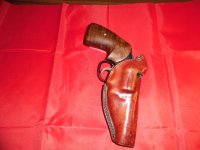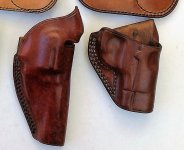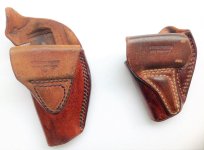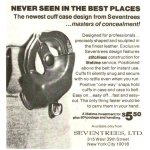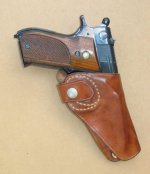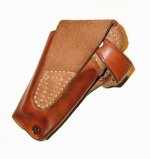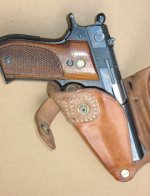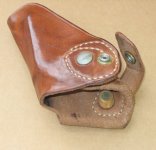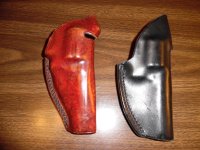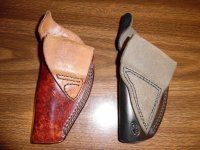rednichols
Member
In my research for The Book I get more and more interested in the people, than the products, behind their companies. And it is their context that makes sense of their contribution to the industry.
Take, for example, Paris Theodore. Contextually his company, Seventrees, doesn't appear to have lasted more than a couple of years. Yet its impact on the industry was very large.
There is a pair of diatribes on the 'net, at The Gun Zone, about Paris. Some folk didn't like him. I emailed the chap back in '13, questioning just what was being accomplished with that, and the reply was, 'you didn't know him then'. And that's true. And I don't doubt that everything about Paris there, is true. And I say that because, the essential facts can be verified elsewhere.
How about his: Paris Theodore is on IMDB. So is his wife Lee Theodore. Paris appeared in a ground-breaking play staged for television with Mary Martin; Martin was a huge star then and I have always remembered seeing it then. And Lee was assistant choreographer for the film West Side Story. A bit more hunting around and one realises that for Paris, the holster bit was just a blip in his life. He went on to be interested in pistols and during the Bond era, his ASP made a lot of sense.
Bios of Paris mention that he died of complications from MS. Ok, everybody dies of something. But it was only by reading about an Australian Olympian who died recently after suffering from MS for four decades, that I realised that Paris could have been dealing with it for so long that he had no reason to care about much else; holsters, pistols, making other people happy. Lee died after a long illness at a nursing home; I reckon that would've sucked up a lot of his attention, on top of his own illness.
Seventrees was supposedly founded in 1966. I say 'supposedly' because I have only two print bios, one derived from the other, to indicate this. I DO have two printed magazine articles about Seventrees that appeared in early 1968. And there is only one known version of his catalogue, and it is always accompanied by a 1969 price list. And an ad from 1972.
From all this I deduce that Bruce Nelson created his holsters -- what is now known as the Summer Special claimed to be 1967; the Professional, ditto; and the Nelson M&P that appeared in Bianchi's 1969 catalogue (only) -- based on what he learnt from those articles and Chic Gaylord's own catalogue which featured the same construction but with less sophisticated styling and features vs. Paris'. Even the performance features, such as clearing the knuckle, were set out by Paris as important; later Bruce emphasised this, too. Did you know that Bruce worked for Bianchi in the late '60s, still a teenager?
Milt Sparks built his company at first, on competition sets to take advantage of the void in the market left by Andy Anderson. He states, in writing, that this market was too fickle and it was his concealment sets that lasted -- and they were Bruce Nelson's holsters, for which Bruce was happy with just being credited.
Then John and I came up with the Askins Avenger followed by the Pistol Pocket; and whether John knew it or not, they were based on my own personal fascination with Paris Theodore's designs.
Put those two together -- Bianchi and Sparks -- then Paris' construction and styling (which he acknowledged were derived from his employer, Chic Gaylord, who operated in the 1950s) had a huge impact on the industry because they are used even today, as what I call the Eastern School of Design.
So: Chic was first, Paris gave it credibility, Bruce jumped on board and Bianchi followed, Milt capitalised on Bruce, Bianchi expanded on the style, and yet Paris only operated a few years.
By the way, speaking of short company life-spans having a big impact on our industry, be aware that Bianchi Holster operated only 1966-1987. Oh, and Bruce was employed by Bianchi during the years he says he created his designs, in the late 1960s. He may even have built his own brand, called CLL, while working for Bianchi.
And John told me he put Chic Gaylord out of business. Yet a set of articles about Chic Gaylord, based on a long interview with him, says he was not bitter about any of the players -- except Paris.
Take, for example, Paris Theodore. Contextually his company, Seventrees, doesn't appear to have lasted more than a couple of years. Yet its impact on the industry was very large.
There is a pair of diatribes on the 'net, at The Gun Zone, about Paris. Some folk didn't like him. I emailed the chap back in '13, questioning just what was being accomplished with that, and the reply was, 'you didn't know him then'. And that's true. And I don't doubt that everything about Paris there, is true. And I say that because, the essential facts can be verified elsewhere.
How about his: Paris Theodore is on IMDB. So is his wife Lee Theodore. Paris appeared in a ground-breaking play staged for television with Mary Martin; Martin was a huge star then and I have always remembered seeing it then. And Lee was assistant choreographer for the film West Side Story. A bit more hunting around and one realises that for Paris, the holster bit was just a blip in his life. He went on to be interested in pistols and during the Bond era, his ASP made a lot of sense.
Bios of Paris mention that he died of complications from MS. Ok, everybody dies of something. But it was only by reading about an Australian Olympian who died recently after suffering from MS for four decades, that I realised that Paris could have been dealing with it for so long that he had no reason to care about much else; holsters, pistols, making other people happy. Lee died after a long illness at a nursing home; I reckon that would've sucked up a lot of his attention, on top of his own illness.
Seventrees was supposedly founded in 1966. I say 'supposedly' because I have only two print bios, one derived from the other, to indicate this. I DO have two printed magazine articles about Seventrees that appeared in early 1968. And there is only one known version of his catalogue, and it is always accompanied by a 1969 price list. And an ad from 1972.
From all this I deduce that Bruce Nelson created his holsters -- what is now known as the Summer Special claimed to be 1967; the Professional, ditto; and the Nelson M&P that appeared in Bianchi's 1969 catalogue (only) -- based on what he learnt from those articles and Chic Gaylord's own catalogue which featured the same construction but with less sophisticated styling and features vs. Paris'. Even the performance features, such as clearing the knuckle, were set out by Paris as important; later Bruce emphasised this, too. Did you know that Bruce worked for Bianchi in the late '60s, still a teenager?
Milt Sparks built his company at first, on competition sets to take advantage of the void in the market left by Andy Anderson. He states, in writing, that this market was too fickle and it was his concealment sets that lasted -- and they were Bruce Nelson's holsters, for which Bruce was happy with just being credited.
Then John and I came up with the Askins Avenger followed by the Pistol Pocket; and whether John knew it or not, they were based on my own personal fascination with Paris Theodore's designs.
Put those two together -- Bianchi and Sparks -- then Paris' construction and styling (which he acknowledged were derived from his employer, Chic Gaylord, who operated in the 1950s) had a huge impact on the industry because they are used even today, as what I call the Eastern School of Design.
So: Chic was first, Paris gave it credibility, Bruce jumped on board and Bianchi followed, Milt capitalised on Bruce, Bianchi expanded on the style, and yet Paris only operated a few years.
By the way, speaking of short company life-spans having a big impact on our industry, be aware that Bianchi Holster operated only 1966-1987. Oh, and Bruce was employed by Bianchi during the years he says he created his designs, in the late 1960s. He may even have built his own brand, called CLL, while working for Bianchi.
And John told me he put Chic Gaylord out of business. Yet a set of articles about Chic Gaylord, based on a long interview with him, says he was not bitter about any of the players -- except Paris.
Last edited:


